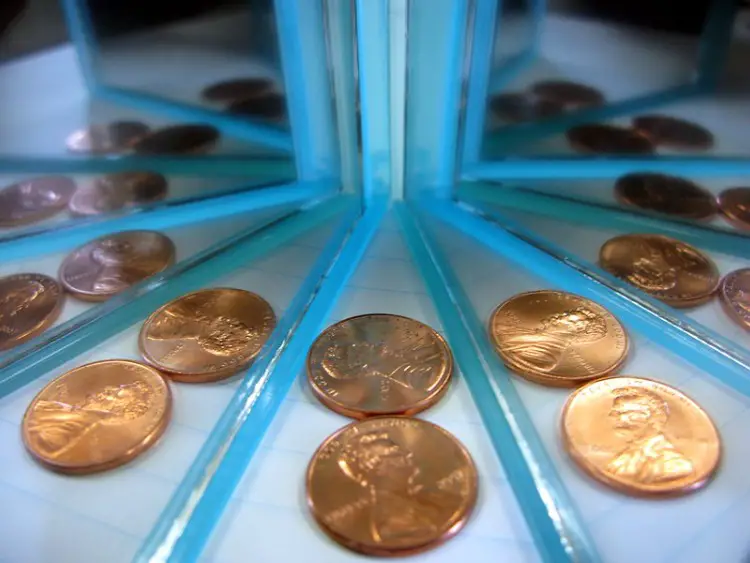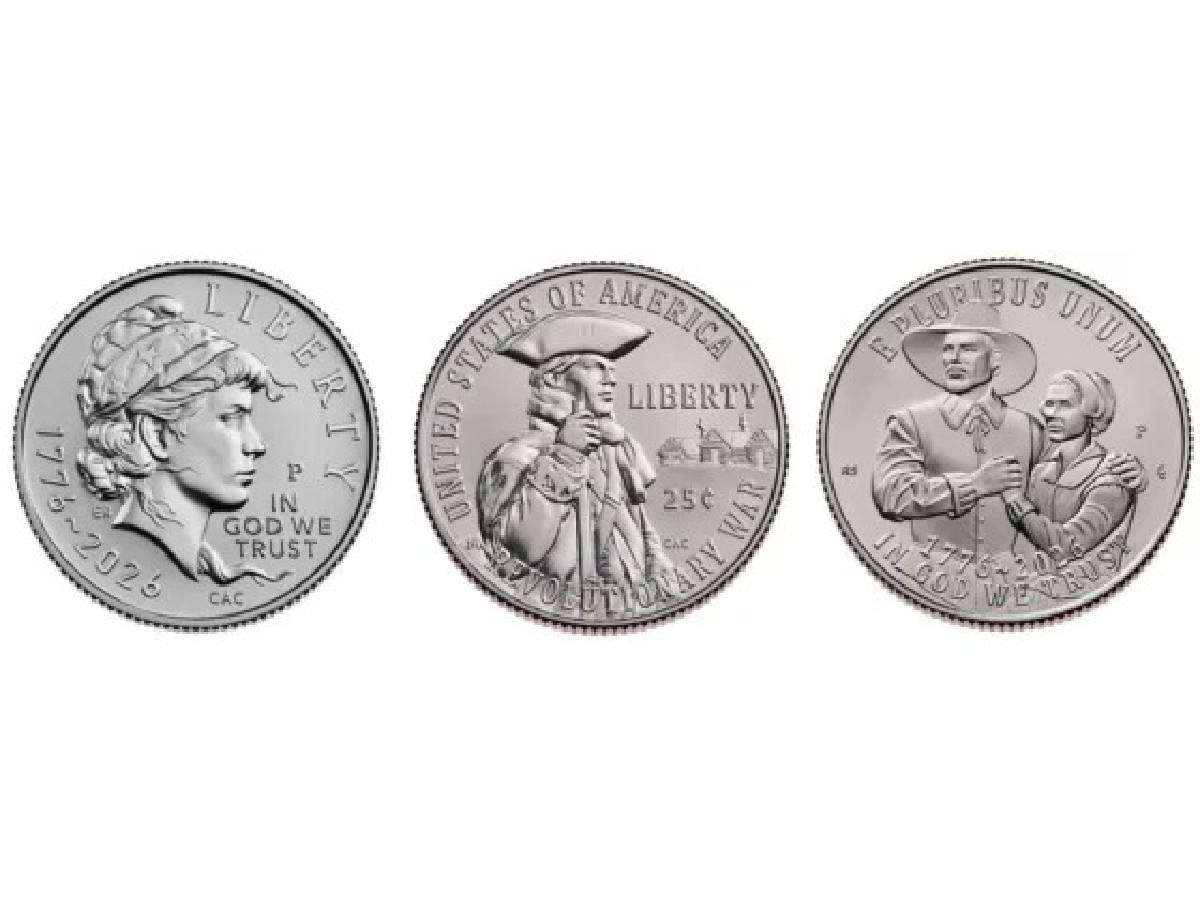It seems the 1909-S VDB penny reigns as king in the world of coin collecting — particularly among coin collectors who are looking for most valuable penny worth big money in their pocket change.

And, there’s no dispute here… the 1909-S VDB Lincoln cent is the rare and valuable regular-issue key date among all Lincoln pennies.
The 1909-S VDB penny is worth around $650 and up — meaning it goes for much more than face value.
While the 1909-S VDB Lincoln penny might be the most popular or storied of rare pennies, it isn’t the rarest or most valuable penny. Not by a long shot!
Today we’re going to look at 10 rare, valuable pennies that are worth more and harder to find than the 1909-S VDB penny.
These are the top 10 most valuable pennies — listed in date order (oldest to newest):
1793 Flowing Hair Chain Penny
The very first penny the United States Mint ever made for distribution into circulation was the 1793 Flowing Hair Chain large cent. It was struck for a period of a few months in 1793 and is so named for the portrait of Miss Liberty with her flowing hair as seen on the obverse (heads side) and the circular chain design on the reverse (tails side) of the coin. Only 36,103 Chain cents were struck, and they are worth around $6,000 and up in a grade of Good-4.
1799 Draped Bust Penny
The 1799 penny is a big key date for those who collect the large cent series — which was produced from 1793 through 1857. Only 42,540 were struck, and the existing number is less than 1,000 pieces! All 1799 pennies are rare, regardless of their condition. Uncirculated specimens are extremely rare, with just one known specimen graded by Professional Coin Grading Service as MS61BN — it is worth $700,000. Circulated 1799 pennies are worth around $5,000 and up.
1804 Draped Bust Penny
Another old penny worth a ton of moolah is the 1804 Draped Bust penny. Only 96,500 were made. Even in low circulated grades, it is worth around $2,000 and up. As an aside, the 1804 date is a special one in coin collecting due to its association with the 1804 Draped Bust silver dollar — which wasn’t made until the 1830s and was included in special proof sets delivered as a diplomatic gifts to foreign heads of state. See this video for more info:
1856 Flying Eagle Penny
The 1856 Flying Eagle penny was issued as a type of pattern coin to test what the new smaller cent would look like in comparison to the large cents. (Remember, large cents measure nearly the size of a modern-day half dollar and they circulated from 1793 to 1857.) The 1856 Flying Eagle cent is a rare coin worth more than $7,000 even in well-worn grades. One reason why this old penny is so rare and valuable is because only an estimated 3,500 were made.
1877 Indian Head Penny
The major key date of the Indian Head cent series is the 1877 penny — a rare and valuable coin that collectors have sought for generations. What makes the 1877 Indian Head penny so rare? Only 852,500 were struck, and of those perhaps 6,000 to 8,000 still exist. Many of these coins were spent as money and damaged or worn to oblivion in the years after they were minted. The 1877 Indian Head penny is worth about $850 and up in circulated grades.
1943 Copper Lincoln Penny
In 1943 the Lincoln penny was minted from zinc-coated steel to help save copper for the World War II effort. Over 1 billion 1943 steel pennies were made, but a few of the traditional copper-based blanks were accidentally left behind in the presses and were struck by 1943-dated dies. There are only a couple dozen known 1943 copper pennies, and they’re worth more than $100,000 apiece. If you want to know whether you have a 1943 copper penny or 1943 steel penny or not, you’ll need a magnet. If your 1943 penny sticks to a magnet it’s a steel cent worth around 15 to 50 cents. If it does NOT stick to a magnet, it may be a 1943 copper penny and it’s a good idea to have it professionally evaluated by a coin expert.
1944 Steel Lincoln Penny
The U.S. Mint switched back to making copper pennies in 1944, but a few steel planchets were punched out with the 1944 date. This valuable error penny is extremely rare — perhaps 30 were struck. They’re worth around $75,000 and up. The way to tell if you have a 1944 steel penny is to check it with a magnet. If your 1944 penny sticks to a magnet, it might be the real deal and should be authenticated by a third-party coin grading service.
1955 Doubled Die Lincoln Penny
One of the most popular error coins of all time is the 1955 doubled die Lincoln penny. This awesome variety shows extreme doubling in the date “1955” and inscriptions “LIBERTY” and “IN GOD WE TRUST” on the obverse. The doubling is so dramatic that it can be seen by the naked eye — no need for a coin magnifying glass, though having one certainly helps. It is estimated that there may have been around 20,000 examples of the 1955 doubled die penny that got out into circulation. This rare and valuable error penny is worth around $1,000 and up.
1969-S Doubled Die Lincoln Penny
Here’s a wild error coin that has really caught the eye of collectors! It’s the 1969-S doubled die penny. This valuable error penny shows some fantastic doubling on the obverse of the coin in the inscriptions “LIBERTY,” “IN GOD WE TRUST,” and in the date. The 1969-S doubled die penny is a very rare coin and valuable with only a couple dozen known so far. They sell for around $30,000 and up. Keep checking your spare change — many of the most recently discovered 1969-S doubled die pennies have been found in circulation!
1982-D Small Date Copper Lincoln Penny
One of the latest additions to the catalog of rare and valuable error pennies is the 1982-D small date copper penny. The first specimen was discovered by a collector in 2016 and a second was found a couple years later. A lot of collectors want to know how to tell a 1982-D small date copper penny from the more common 1982-D large date copper (or zinc) penny. The tops of the date numerals on the 1982 small date penny must align on an invisible plane. (On the large date penny, the “9” and “8” appear to stand higher than the “1” and “2.”) The coin must also have the “D” mintmark under the date and weigh around 3 to 3.1 grams. (The lighter-weight large date zinc penny registers at approximately 2.5 grams.) You can potentially find the 1982-D small date copper penny in pocket change, and all the hard work of looking would be worth it. The 1982-D small date copper penny is worth $10,000+!
See what the professional coin grading abbreviations mean — to help you determine the grade of your coins.




